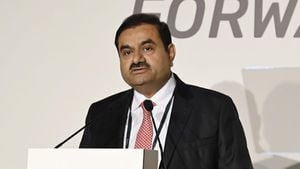At the heart of this year’s COP29 climate conference, which is taking place in Baku, Azerbaijan, intense debates around the phasing out of fossil fuels have emerged, illustrating stark divisions among participating nations. The UK has laid down the gauntlet, urging all countries to adhere to the landmark agreements achieved at last year's COP28 and to revitalize their commitments to transitioning away from fossil fuels. Yet, the latest proposals unveiled at COP29 have led to increased tensions, particularly as they reflect divergent views on climate finance aimed at assisting less wealthy nations.
The conference began on shaky grounds, with heated criticism bouncing back and forth between developed and developing nations over the latest proposals, which many believe are insufficient to combat the climate crisis. Key players from the UK, European Union, Australia, and New Zealand have rallied for agreements to extend previous commitments aimed at phasing out fossil fuels—a proposition encountering significant resistance from oil-rich nations, particularly Saudi Arabia.
Rachel Kyte, the UK’s climate envoy, voiced the urgency of adhering to the COP28 agreements, which advocated for Nationally Determined Contributions (NDCs) to encompass all greenhouse gases and align with the ambitious goal of limiting global heating to 1.5 degrees Celsius. "We cannot slide back from this agreement," she stated emphatically. Kyte's remarks capture the palpable anxiety many delegates feel at COP29, as countries grapple with the notion of maintaining momentum from previous negotiations.
The European Union expressed similar frustration. Wopke Hoekstra, the EU Commissioner for Climate Action, remarked bluntly, "The current proposals are clearly unacceptable." He criticized the vagueness of certain elements, insisting on the necessity to not only reaffirm commitments but to advance them. The strong language used by both Kyte and Hoekstra echoes the concerns echoed by many climate activists who fear significant backtracking on previously established goals.
Activists, too, have been vocal about their dismay at the negotiations. David Tong from Oil Change International called the latest discussions “lackluster,” commenting, "Ambition has gone missing" when it’s needed most. The scaling back of fossil fuel commitments is particularly alarming for advocates who have worked tirelessly to press for urgent action to combat climate change.
The backdrop to this intensification of debates is the troubling indication from leaders of the G20 summit held earlier this week in Brazil, where fossil fuel phase-out was not directly addressed. This omission raised flags for many observers, who noted the hesitance of industrialized nations to fully confront the realities of the climate crisis.
Compounding these issues are stark divisions between wealthier and poorer countries over climate finance. The latest proposals have introduced two drastically different approaches: one posits rich nations should transfer at least one trillion US dollars annually to support developing countries beginning in 2025. The alternative option suggests starting this level of funding only by 2035, which many developing nations see as inadequate. This divergence has shut down negotiations, leaving many feeling stuck without clear paths to compromise.
Economists have highlighted the pressing need for significant investment to meet the targets set by the 2015 Paris Agreement, warning of the dire consequences of failing to catalyze at least one trillion dollars annually flowing to developing nations by 2030. The importance of this funding cannot be overstated; it’s viewed as the lifeline for countries already grappling with climate-related catastrophes.
Andreas Sieber, representing the campaign group 350.org, encapsulated the urgency of the situation: "The fight is on for getting transformational finance goals... We’ll see pushback from rich nations who will want the wishy-washy climate finance option. That is not what we can accept here." This sentiment was echoed by Carola Mejia from the Latin American Network for Economic and Social Justice, who pointed out, "A 2035 target could be too late for us. We are already suffering the impacts." This perspective reflects the harsh reality faced by those on the frontline of climate change who find themselves at risk if corrective measures aren’t swiftly enacted.
Neither of the conflicting finance options put forward at COP29 adequately align with the UK’s expectations, which revolve around reaching a balanced compromise agreement. Leading the negotiations, the UK has played a pivotal role, organizing sessions alongside Brazil to gather insights from various national parties. Their goal is to unify the discordant voices and establish a workable framework for moving forward with funding, mitigation, and adaptation strategies.
The road to consensus remains fraught with challenges, as many observers at COP29 are skeptical of how—if at all—a compromise can be struck amid such pronounced disparities in priorities. Several advocates believe catastrophic climate effects driven by fossil fuel reliance demand immediate and radical changes to current systems.
Overall, the COP29 conference stands as both a platform for dialogue and a battleground for contrasting ideologies about climate action. While calls for ambitious fossil fuel phase-out resonate among several nations, the considerable pushback from major oil-producing states hints at the logistical and political difficulties of transitioning to sustainable energy sources on the global stage. Each competing proposal carries weighty implications for the future, echoing the urgent but often contentious struggle to reconcile economic interests with the pressing need for environmental stewardship.
The outcomes of COP29 will significantly shape the narrative of climate action for years to come as these discussions not only impact individual nations but have far-reaching consequences for global climate resilience. The tensions and discussions here will serve as both a litmus test for international resolve and as reflections of the broader struggle against growing climate crises.



